HI6027 Business and Corporate Law: Legal Principles and Analysis
VerifiedAdded on 2023/06/17
|7
|3142
|488
Homework Assignment
AI Summary
This document presents a student's solution to the HI6027 Business and Corporate Law final assessment, Trimester 2, 2021. It includes answers to questions covering public and private law, enforceability of contracts, and negligence claims. The solution analyzes scenarios involving contract disputes, lease agreements, and workplace incidents, applying relevant legal principles and reasoning. Topics covered are the differences between public and private law, the necessity of written contracts, and the elements of a negligence claim, including causation. The document provides detailed explanations and legal reasoning related to contract law and tort law.

Student Number: (enter on the line below)
Student Name: (enter on the line below)
HI6027
BUSINESS AND CORPORATE LAW
FINAL ASSESSMENT
TRIMESTER 2, 2021
Assessment Weight: 50 total marks
Instructions:
● All questionsmust be answered by using the answer boxes provided in this paper.
● Completed answers must be submitted to Blackboard by the published due date
and time.
Submission instructions are at the end of this paper.
Purpose:
This assessment consists of six (6) questions and is designed to assess your level of
knowledge of the key topics covered in this unit.
HI6027Final Assessment T2 2021
Student Name: (enter on the line below)
HI6027
BUSINESS AND CORPORATE LAW
FINAL ASSESSMENT
TRIMESTER 2, 2021
Assessment Weight: 50 total marks
Instructions:
● All questionsmust be answered by using the answer boxes provided in this paper.
● Completed answers must be submitted to Blackboard by the published due date
and time.
Submission instructions are at the end of this paper.
Purpose:
This assessment consists of six (6) questions and is designed to assess your level of
knowledge of the key topics covered in this unit.
HI6027Final Assessment T2 2021
Paraphrase This Document
Need a fresh take? Get an instant paraphrase of this document with our AI Paraphraser
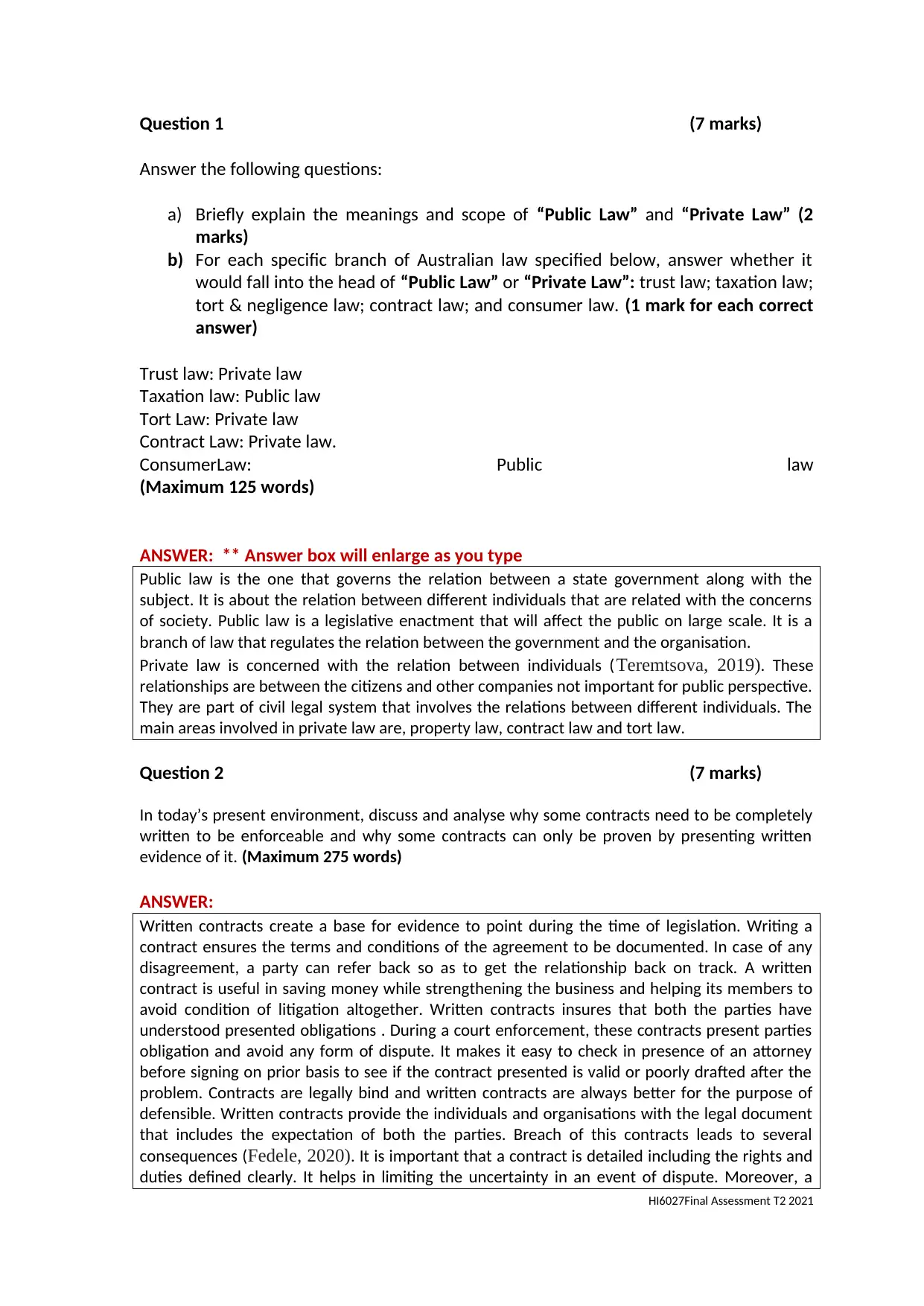
Question 1 (7 marks)
Answer the following questions:
a) Briefly explain the meanings and scope of “Public Law” and “Private Law” (2
marks)
b) For each specific branch of Australian law specified below, answer whether it
would fall into the head of “Public Law” or “Private Law”: trust law; taxation law;
tort & negligence law; contract law; and consumer law. (1 mark for each correct
answer)
Trust law: Private law
Taxation law: Public law
Tort Law: Private law
Contract Law: Private law.
ConsumerLaw: Public law
(Maximum 125 words)
ANSWER: ** Answer box will enlarge as you type
Public law is the one that governs the relation between a state government along with the
subject. It is about the relation between different individuals that are related with the concerns
of society. Public law is a legislative enactment that will affect the public on large scale. It is a
branch of law that regulates the relation between the government and the organisation.
Private law is concerned with the relation between individuals (Teremtsova, 2019). These
relationships are between the citizens and other companies not important for public perspective.
They are part of civil legal system that involves the relations between different individuals. The
main areas involved in private law are, property law, contract law and tort law.
Question 2 (7 marks)
In today’s present environment, discuss and analyse why some contracts need to be completely
written to be enforceable and why some contracts can only be proven by presenting written
evidence of it. (Maximum 275 words)
ANSWER:
Written contracts create a base for evidence to point during the time of legislation. Writing a
contract ensures the terms and conditions of the agreement to be documented. In case of any
disagreement, a party can refer back so as to get the relationship back on track. A written
contract is useful in saving money while strengthening the business and helping its members to
avoid condition of litigation altogether. Written contracts insures that both the parties have
understood presented obligations . During a court enforcement, these contracts present parties
obligation and avoid any form of dispute. It makes it easy to check in presence of an attorney
before signing on prior basis to see if the contract presented is valid or poorly drafted after the
problem. Contracts are legally bind and written contracts are always better for the purpose of
defensible. Written contracts provide the individuals and organisations with the legal document
that includes the expectation of both the parties. Breach of this contracts leads to several
consequences (Fedele, 2020). It is important that a contract is detailed including the rights and
duties defined clearly. It helps in limiting the uncertainty in an event of dispute. Moreover, a
HI6027Final Assessment T2 2021
Answer the following questions:
a) Briefly explain the meanings and scope of “Public Law” and “Private Law” (2
marks)
b) For each specific branch of Australian law specified below, answer whether it
would fall into the head of “Public Law” or “Private Law”: trust law; taxation law;
tort & negligence law; contract law; and consumer law. (1 mark for each correct
answer)
Trust law: Private law
Taxation law: Public law
Tort Law: Private law
Contract Law: Private law.
ConsumerLaw: Public law
(Maximum 125 words)
ANSWER: ** Answer box will enlarge as you type
Public law is the one that governs the relation between a state government along with the
subject. It is about the relation between different individuals that are related with the concerns
of society. Public law is a legislative enactment that will affect the public on large scale. It is a
branch of law that regulates the relation between the government and the organisation.
Private law is concerned with the relation between individuals (Teremtsova, 2019). These
relationships are between the citizens and other companies not important for public perspective.
They are part of civil legal system that involves the relations between different individuals. The
main areas involved in private law are, property law, contract law and tort law.
Question 2 (7 marks)
In today’s present environment, discuss and analyse why some contracts need to be completely
written to be enforceable and why some contracts can only be proven by presenting written
evidence of it. (Maximum 275 words)
ANSWER:
Written contracts create a base for evidence to point during the time of legislation. Writing a
contract ensures the terms and conditions of the agreement to be documented. In case of any
disagreement, a party can refer back so as to get the relationship back on track. A written
contract is useful in saving money while strengthening the business and helping its members to
avoid condition of litigation altogether. Written contracts insures that both the parties have
understood presented obligations . During a court enforcement, these contracts present parties
obligation and avoid any form of dispute. It makes it easy to check in presence of an attorney
before signing on prior basis to see if the contract presented is valid or poorly drafted after the
problem. Contracts are legally bind and written contracts are always better for the purpose of
defensible. Written contracts provide the individuals and organisations with the legal document
that includes the expectation of both the parties. Breach of this contracts leads to several
consequences (Fedele, 2020). It is important that a contract is detailed including the rights and
duties defined clearly. It helps in limiting the uncertainty in an event of dispute. Moreover, a
HI6027Final Assessment T2 2021
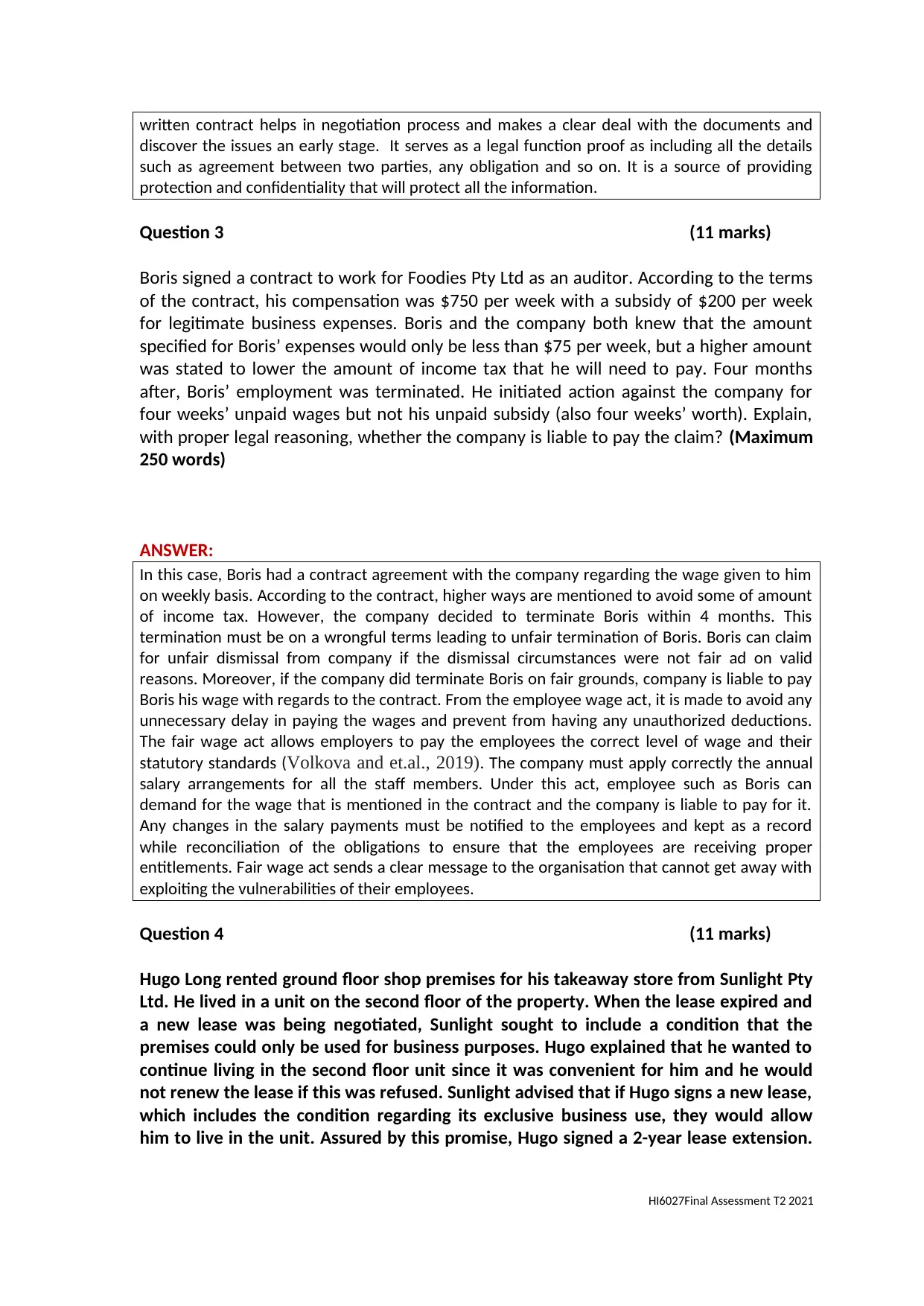
written contract helps in negotiation process and makes a clear deal with the documents and
discover the issues an early stage. It serves as a legal function proof as including all the details
such as agreement between two parties, any obligation and so on. It is a source of providing
protection and confidentiality that will protect all the information.
Question 3 (11 marks)
Boris signed a contract to work for Foodies Pty Ltd as an auditor. According to the terms
of the contract, his compensation was $750 per week with a subsidy of $200 per week
for legitimate business expenses. Boris and the company both knew that the amount
specified for Boris’ expenses would only be less than $75 per week, but a higher amount
was stated to lower the amount of income tax that he will need to pay. Four months
after, Boris’ employment was terminated. He initiated action against the company for
four weeks’ unpaid wages but not his unpaid subsidy (also four weeks’ worth). Explain,
with proper legal reasoning, whether the company is liable to pay the claim? (Maximum
250 words)
ANSWER:
In this case, Boris had a contract agreement with the company regarding the wage given to him
on weekly basis. According to the contract, higher ways are mentioned to avoid some of amount
of income tax. However, the company decided to terminate Boris within 4 months. This
termination must be on a wrongful terms leading to unfair termination of Boris. Boris can claim
for unfair dismissal from company if the dismissal circumstances were not fair ad on valid
reasons. Moreover, if the company did terminate Boris on fair grounds, company is liable to pay
Boris his wage with regards to the contract. From the employee wage act, it is made to avoid any
unnecessary delay in paying the wages and prevent from having any unauthorized deductions.
The fair wage act allows employers to pay the employees the correct level of wage and their
statutory standards (Volkova and et.al., 2019). The company must apply correctly the annual
salary arrangements for all the staff members. Under this act, employee such as Boris can
demand for the wage that is mentioned in the contract and the company is liable to pay for it.
Any changes in the salary payments must be notified to the employees and kept as a record
while reconciliation of the obligations to ensure that the employees are receiving proper
entitlements. Fair wage act sends a clear message to the organisation that cannot get away with
exploiting the vulnerabilities of their employees.
Question 4 (11 marks)
Hugo Long rented ground floor shop premises for his takeaway store from Sunlight Pty
Ltd. He lived in a unit on the second floor of the property. When the lease expired and
a new lease was being negotiated, Sunlight sought to include a condition that the
premises could only be used for business purposes. Hugo explained that he wanted to
continue living in the second floor unit since it was convenient for him and he would
not renew the lease if this was refused. Sunlight advised that if Hugo signs a new lease,
which includes the condition regarding its exclusive business use, they would allow
him to live in the unit. Assured by this promise, Hugo signed a 2-year lease extension.
HI6027Final Assessment T2 2021
discover the issues an early stage. It serves as a legal function proof as including all the details
such as agreement between two parties, any obligation and so on. It is a source of providing
protection and confidentiality that will protect all the information.
Question 3 (11 marks)
Boris signed a contract to work for Foodies Pty Ltd as an auditor. According to the terms
of the contract, his compensation was $750 per week with a subsidy of $200 per week
for legitimate business expenses. Boris and the company both knew that the amount
specified for Boris’ expenses would only be less than $75 per week, but a higher amount
was stated to lower the amount of income tax that he will need to pay. Four months
after, Boris’ employment was terminated. He initiated action against the company for
four weeks’ unpaid wages but not his unpaid subsidy (also four weeks’ worth). Explain,
with proper legal reasoning, whether the company is liable to pay the claim? (Maximum
250 words)
ANSWER:
In this case, Boris had a contract agreement with the company regarding the wage given to him
on weekly basis. According to the contract, higher ways are mentioned to avoid some of amount
of income tax. However, the company decided to terminate Boris within 4 months. This
termination must be on a wrongful terms leading to unfair termination of Boris. Boris can claim
for unfair dismissal from company if the dismissal circumstances were not fair ad on valid
reasons. Moreover, if the company did terminate Boris on fair grounds, company is liable to pay
Boris his wage with regards to the contract. From the employee wage act, it is made to avoid any
unnecessary delay in paying the wages and prevent from having any unauthorized deductions.
The fair wage act allows employers to pay the employees the correct level of wage and their
statutory standards (Volkova and et.al., 2019). The company must apply correctly the annual
salary arrangements for all the staff members. Under this act, employee such as Boris can
demand for the wage that is mentioned in the contract and the company is liable to pay for it.
Any changes in the salary payments must be notified to the employees and kept as a record
while reconciliation of the obligations to ensure that the employees are receiving proper
entitlements. Fair wage act sends a clear message to the organisation that cannot get away with
exploiting the vulnerabilities of their employees.
Question 4 (11 marks)
Hugo Long rented ground floor shop premises for his takeaway store from Sunlight Pty
Ltd. He lived in a unit on the second floor of the property. When the lease expired and
a new lease was being negotiated, Sunlight sought to include a condition that the
premises could only be used for business purposes. Hugo explained that he wanted to
continue living in the second floor unit since it was convenient for him and he would
not renew the lease if this was refused. Sunlight advised that if Hugo signs a new lease,
which includes the condition regarding its exclusive business use, they would allow
him to live in the unit. Assured by this promise, Hugo signed a 2-year lease extension.
HI6027Final Assessment T2 2021
⊘ This is a preview!⊘
Do you want full access?
Subscribe today to unlock all pages.

Trusted by 1+ million students worldwide
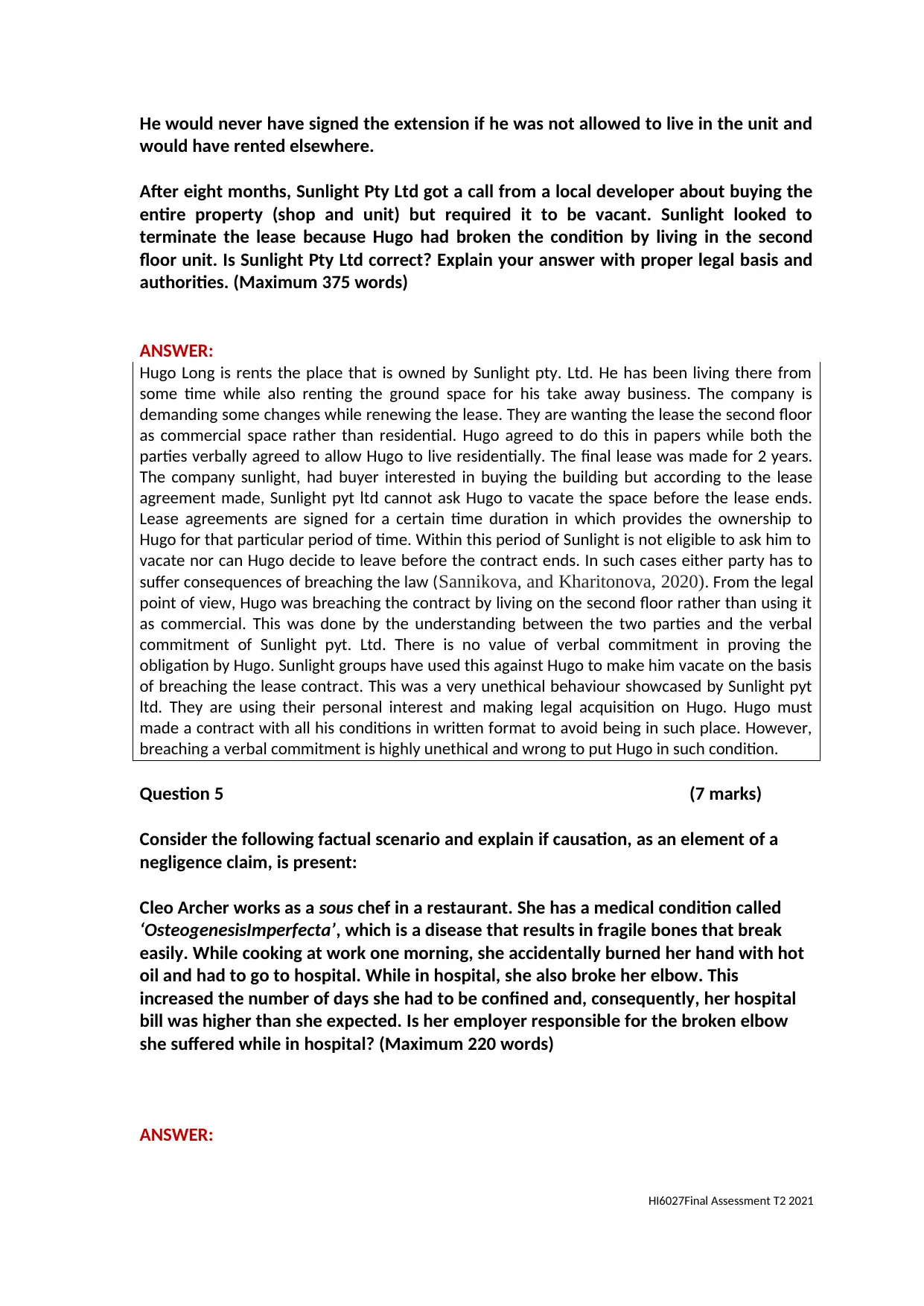
He would never have signed the extension if he was not allowed to live in the unit and
would have rented elsewhere.
After eight months, Sunlight Pty Ltd got a call from a local developer about buying the
entire property (shop and unit) but required it to be vacant. Sunlight looked to
terminate the lease because Hugo had broken the condition by living in the second
floor unit. Is Sunlight Pty Ltd correct? Explain your answer with proper legal basis and
authorities. (Maximum 375 words)
ANSWER:
Hugo Long is rents the place that is owned by Sunlight pty. Ltd. He has been living there from
some time while also renting the ground space for his take away business. The company is
demanding some changes while renewing the lease. They are wanting the lease the second floor
as commercial space rather than residential. Hugo agreed to do this in papers while both the
parties verbally agreed to allow Hugo to live residentially. The final lease was made for 2 years.
The company sunlight, had buyer interested in buying the building but according to the lease
agreement made, Sunlight pyt ltd cannot ask Hugo to vacate the space before the lease ends.
Lease agreements are signed for a certain time duration in which provides the ownership to
Hugo for that particular period of time. Within this period of Sunlight is not eligible to ask him to
vacate nor can Hugo decide to leave before the contract ends. In such cases either party has to
suffer consequences of breaching the law (Sannikova, and Kharitonova, 2020). From the legal
point of view, Hugo was breaching the contract by living on the second floor rather than using it
as commercial. This was done by the understanding between the two parties and the verbal
commitment of Sunlight pyt. Ltd. There is no value of verbal commitment in proving the
obligation by Hugo. Sunlight groups have used this against Hugo to make him vacate on the basis
of breaching the lease contract. This was a very unethical behaviour showcased by Sunlight pyt
ltd. They are using their personal interest and making legal acquisition on Hugo. Hugo must
made a contract with all his conditions in written format to avoid being in such place. However,
breaching a verbal commitment is highly unethical and wrong to put Hugo in such condition.
Question 5 (7 marks)
Consider the following factual scenario and explain if causation, as an element of a
negligence claim, is present:
Cleo Archer works as a sous chef in a restaurant. She has a medical condition called
‘OsteogenesisImperfecta’, which is a disease that results in fragile bones that break
easily. While cooking at work one morning, she accidentally burned her hand with hot
oil and had to go to hospital. While in hospital, she also broke her elbow. This
increased the number of days she had to be confined and, consequently, her hospital
bill was higher than she expected. Is her employer responsible for the broken elbow
she suffered while in hospital? (Maximum 220 words)
ANSWER:
HI6027Final Assessment T2 2021
would have rented elsewhere.
After eight months, Sunlight Pty Ltd got a call from a local developer about buying the
entire property (shop and unit) but required it to be vacant. Sunlight looked to
terminate the lease because Hugo had broken the condition by living in the second
floor unit. Is Sunlight Pty Ltd correct? Explain your answer with proper legal basis and
authorities. (Maximum 375 words)
ANSWER:
Hugo Long is rents the place that is owned by Sunlight pty. Ltd. He has been living there from
some time while also renting the ground space for his take away business. The company is
demanding some changes while renewing the lease. They are wanting the lease the second floor
as commercial space rather than residential. Hugo agreed to do this in papers while both the
parties verbally agreed to allow Hugo to live residentially. The final lease was made for 2 years.
The company sunlight, had buyer interested in buying the building but according to the lease
agreement made, Sunlight pyt ltd cannot ask Hugo to vacate the space before the lease ends.
Lease agreements are signed for a certain time duration in which provides the ownership to
Hugo for that particular period of time. Within this period of Sunlight is not eligible to ask him to
vacate nor can Hugo decide to leave before the contract ends. In such cases either party has to
suffer consequences of breaching the law (Sannikova, and Kharitonova, 2020). From the legal
point of view, Hugo was breaching the contract by living on the second floor rather than using it
as commercial. This was done by the understanding between the two parties and the verbal
commitment of Sunlight pyt. Ltd. There is no value of verbal commitment in proving the
obligation by Hugo. Sunlight groups have used this against Hugo to make him vacate on the basis
of breaching the lease contract. This was a very unethical behaviour showcased by Sunlight pyt
ltd. They are using their personal interest and making legal acquisition on Hugo. Hugo must
made a contract with all his conditions in written format to avoid being in such place. However,
breaching a verbal commitment is highly unethical and wrong to put Hugo in such condition.
Question 5 (7 marks)
Consider the following factual scenario and explain if causation, as an element of a
negligence claim, is present:
Cleo Archer works as a sous chef in a restaurant. She has a medical condition called
‘OsteogenesisImperfecta’, which is a disease that results in fragile bones that break
easily. While cooking at work one morning, she accidentally burned her hand with hot
oil and had to go to hospital. While in hospital, she also broke her elbow. This
increased the number of days she had to be confined and, consequently, her hospital
bill was higher than she expected. Is her employer responsible for the broken elbow
she suffered while in hospital? (Maximum 220 words)
ANSWER:
HI6027Final Assessment T2 2021
Paraphrase This Document
Need a fresh take? Get an instant paraphrase of this document with our AI Paraphraser
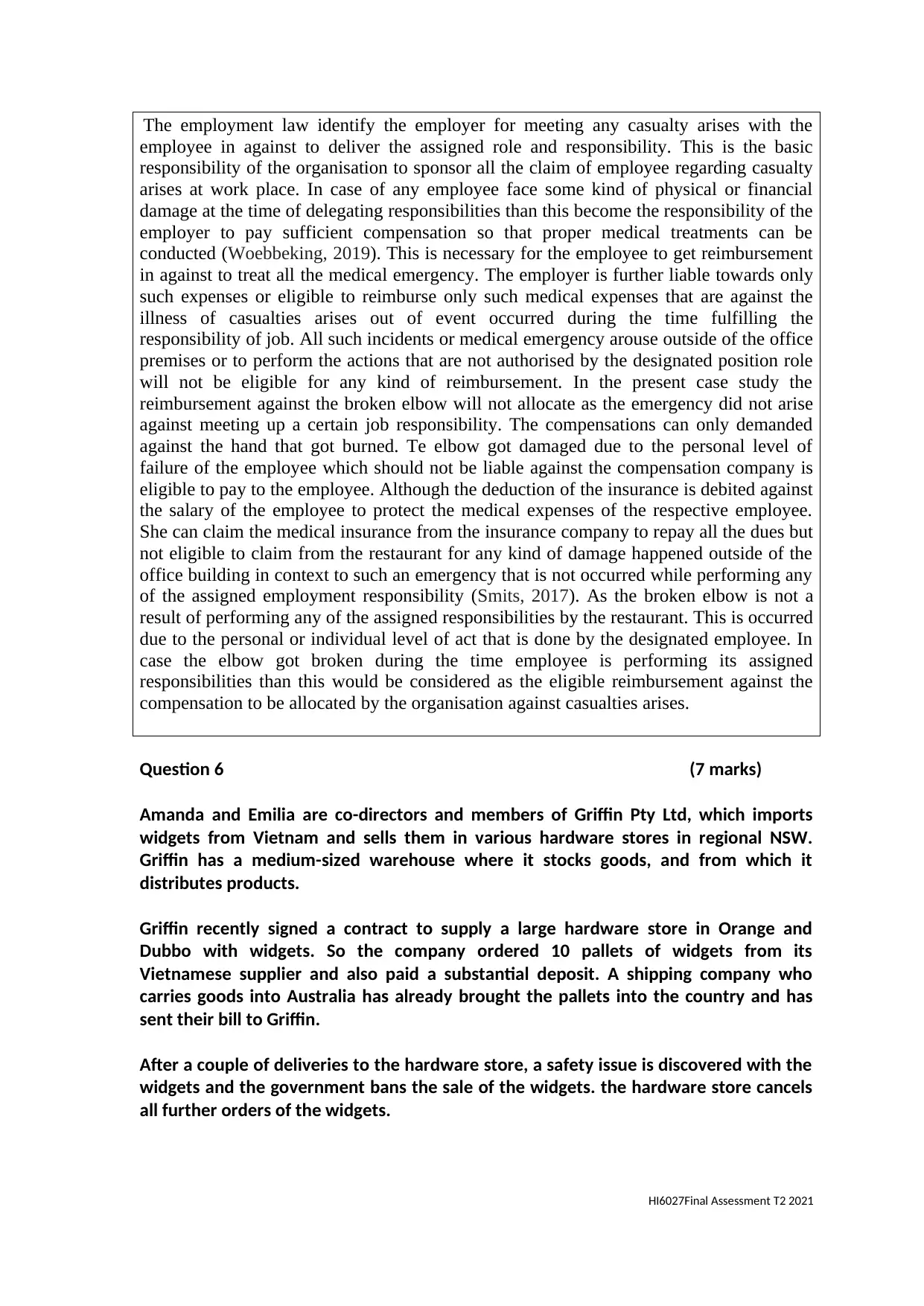
The employment law identify the employer for meeting any casualty arises with the
employee in against to deliver the assigned role and responsibility. This is the basic
responsibility of the organisation to sponsor all the claim of employee regarding casualty
arises at work place. In case of any employee face some kind of physical or financial
damage at the time of delegating responsibilities than this become the responsibility of the
employer to pay sufficient compensation so that proper medical treatments can be
conducted (Woebbeking, 2019). This is necessary for the employee to get reimbursement
in against to treat all the medical emergency. The employer is further liable towards only
such expenses or eligible to reimburse only such medical expenses that are against the
illness of casualties arises out of event occurred during the time fulfilling the
responsibility of job. All such incidents or medical emergency arouse outside of the office
premises or to perform the actions that are not authorised by the designated position role
will not be eligible for any kind of reimbursement. In the present case study the
reimbursement against the broken elbow will not allocate as the emergency did not arise
against meeting up a certain job responsibility. The compensations can only demanded
against the hand that got burned. Te elbow got damaged due to the personal level of
failure of the employee which should not be liable against the compensation company is
eligible to pay to the employee. Although the deduction of the insurance is debited against
the salary of the employee to protect the medical expenses of the respective employee.
She can claim the medical insurance from the insurance company to repay all the dues but
not eligible to claim from the restaurant for any kind of damage happened outside of the
office building in context to such an emergency that is not occurred while performing any
of the assigned employment responsibility (Smits, 2017). As the broken elbow is not a
result of performing any of the assigned responsibilities by the restaurant. This is occurred
due to the personal or individual level of act that is done by the designated employee. In
case the elbow got broken during the time employee is performing its assigned
responsibilities than this would be considered as the eligible reimbursement against the
compensation to be allocated by the organisation against casualties arises.
Question 6 (7 marks)
Amanda and Emilia are co-directors and members of Griffin Pty Ltd, which imports
widgets from Vietnam and sells them in various hardware stores in regional NSW.
Griffin has a medium-sized warehouse where it stocks goods, and from which it
distributes products.
Griffin recently signed a contract to supply a large hardware store in Orange and
Dubbo with widgets. So the company ordered 10 pallets of widgets from its
Vietnamese supplier and also paid a substantial deposit. A shipping company who
carries goods into Australia has already brought the pallets into the country and has
sent their bill to Griffin.
After a couple of deliveries to the hardware store, a safety issue is discovered with the
widgets and the government bans the sale of the widgets. the hardware store cancels
all further orders of the widgets.
HI6027Final Assessment T2 2021
employee in against to deliver the assigned role and responsibility. This is the basic
responsibility of the organisation to sponsor all the claim of employee regarding casualty
arises at work place. In case of any employee face some kind of physical or financial
damage at the time of delegating responsibilities than this become the responsibility of the
employer to pay sufficient compensation so that proper medical treatments can be
conducted (Woebbeking, 2019). This is necessary for the employee to get reimbursement
in against to treat all the medical emergency. The employer is further liable towards only
such expenses or eligible to reimburse only such medical expenses that are against the
illness of casualties arises out of event occurred during the time fulfilling the
responsibility of job. All such incidents or medical emergency arouse outside of the office
premises or to perform the actions that are not authorised by the designated position role
will not be eligible for any kind of reimbursement. In the present case study the
reimbursement against the broken elbow will not allocate as the emergency did not arise
against meeting up a certain job responsibility. The compensations can only demanded
against the hand that got burned. Te elbow got damaged due to the personal level of
failure of the employee which should not be liable against the compensation company is
eligible to pay to the employee. Although the deduction of the insurance is debited against
the salary of the employee to protect the medical expenses of the respective employee.
She can claim the medical insurance from the insurance company to repay all the dues but
not eligible to claim from the restaurant for any kind of damage happened outside of the
office building in context to such an emergency that is not occurred while performing any
of the assigned employment responsibility (Smits, 2017). As the broken elbow is not a
result of performing any of the assigned responsibilities by the restaurant. This is occurred
due to the personal or individual level of act that is done by the designated employee. In
case the elbow got broken during the time employee is performing its assigned
responsibilities than this would be considered as the eligible reimbursement against the
compensation to be allocated by the organisation against casualties arises.
Question 6 (7 marks)
Amanda and Emilia are co-directors and members of Griffin Pty Ltd, which imports
widgets from Vietnam and sells them in various hardware stores in regional NSW.
Griffin has a medium-sized warehouse where it stocks goods, and from which it
distributes products.
Griffin recently signed a contract to supply a large hardware store in Orange and
Dubbo with widgets. So the company ordered 10 pallets of widgets from its
Vietnamese supplier and also paid a substantial deposit. A shipping company who
carries goods into Australia has already brought the pallets into the country and has
sent their bill to Griffin.
After a couple of deliveries to the hardware store, a safety issue is discovered with the
widgets and the government bans the sale of the widgets. the hardware store cancels
all further orders of the widgets.
HI6027Final Assessment T2 2021
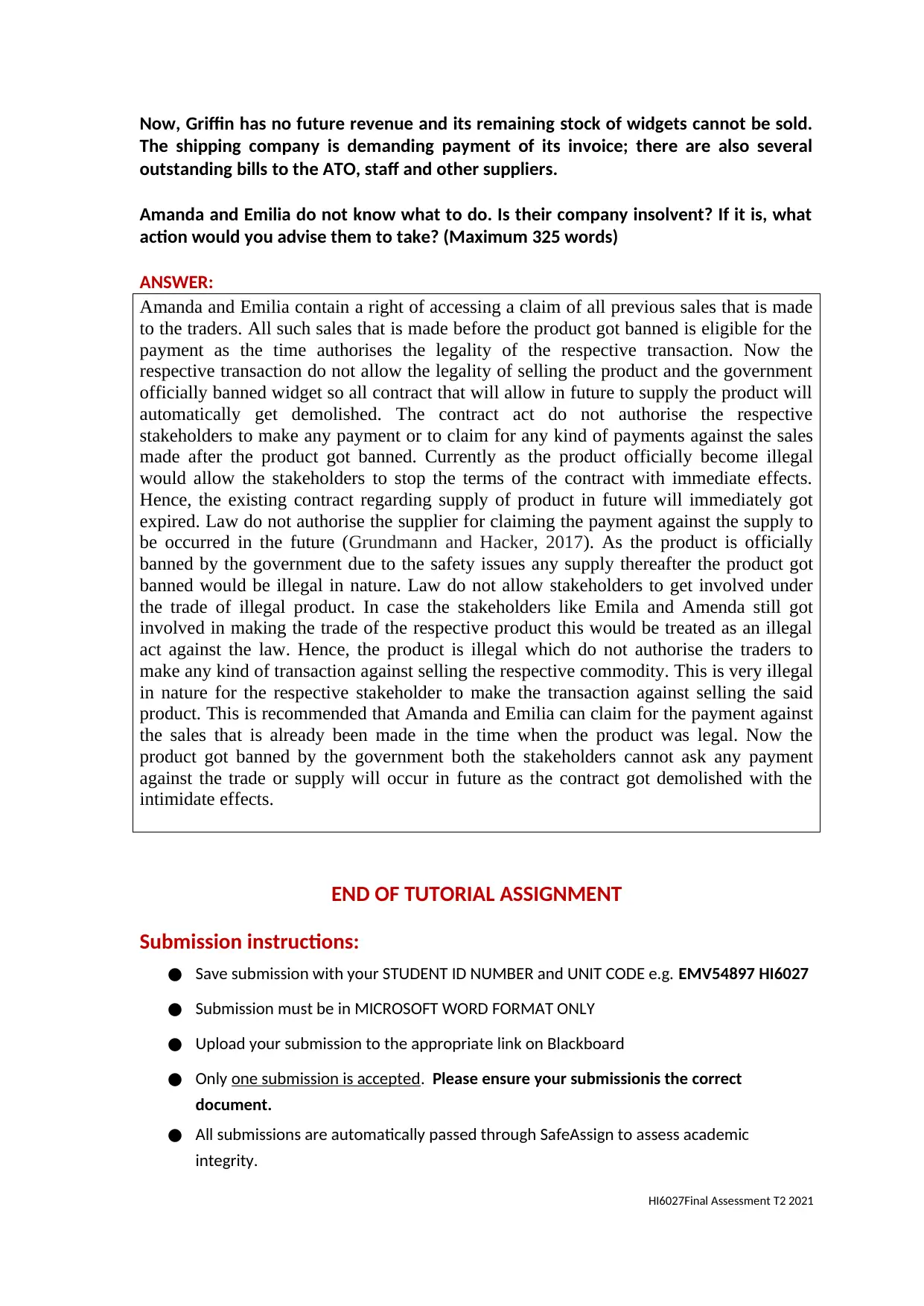
Now, Griffin has no future revenue and its remaining stock of widgets cannot be sold.
The shipping company is demanding payment of its invoice; there are also several
outstanding bills to the ATO, staff and other suppliers.
Amanda and Emilia do not know what to do. Is their company insolvent? If it is, what
action would you advise them to take? (Maximum 325 words)
ANSWER:
Amanda and Emilia contain a right of accessing a claim of all previous sales that is made
to the traders. All such sales that is made before the product got banned is eligible for the
payment as the time authorises the legality of the respective transaction. Now the
respective transaction do not allow the legality of selling the product and the government
officially banned widget so all contract that will allow in future to supply the product will
automatically get demolished. The contract act do not authorise the respective
stakeholders to make any payment or to claim for any kind of payments against the sales
made after the product got banned. Currently as the product officially become illegal
would allow the stakeholders to stop the terms of the contract with immediate effects.
Hence, the existing contract regarding supply of product in future will immediately got
expired. Law do not authorise the supplier for claiming the payment against the supply to
be occurred in the future (Grundmann and Hacker, 2017). As the product is officially
banned by the government due to the safety issues any supply thereafter the product got
banned would be illegal in nature. Law do not allow stakeholders to get involved under
the trade of illegal product. In case the stakeholders like Emila and Amenda still got
involved in making the trade of the respective product this would be treated as an illegal
act against the law. Hence, the product is illegal which do not authorise the traders to
make any kind of transaction against selling the respective commodity. This is very illegal
in nature for the respective stakeholder to make the transaction against selling the said
product. This is recommended that Amanda and Emilia can claim for the payment against
the sales that is already been made in the time when the product was legal. Now the
product got banned by the government both the stakeholders cannot ask any payment
against the trade or supply will occur in future as the contract got demolished with the
intimidate effects.
END OF TUTORIAL ASSIGNMENT
Submission instructions:
● Save submission with your STUDENT ID NUMBER and UNIT CODE e.g. EMV54897 HI6027
● Submission must be in MICROSOFT WORD FORMAT ONLY
● Upload your submission to the appropriate link on Blackboard
● Only one submission is accepted. Please ensure your submissionis the correct
document.
● All submissions are automatically passed through SafeAssign to assess academic
integrity.
HI6027Final Assessment T2 2021
The shipping company is demanding payment of its invoice; there are also several
outstanding bills to the ATO, staff and other suppliers.
Amanda and Emilia do not know what to do. Is their company insolvent? If it is, what
action would you advise them to take? (Maximum 325 words)
ANSWER:
Amanda and Emilia contain a right of accessing a claim of all previous sales that is made
to the traders. All such sales that is made before the product got banned is eligible for the
payment as the time authorises the legality of the respective transaction. Now the
respective transaction do not allow the legality of selling the product and the government
officially banned widget so all contract that will allow in future to supply the product will
automatically get demolished. The contract act do not authorise the respective
stakeholders to make any payment or to claim for any kind of payments against the sales
made after the product got banned. Currently as the product officially become illegal
would allow the stakeholders to stop the terms of the contract with immediate effects.
Hence, the existing contract regarding supply of product in future will immediately got
expired. Law do not authorise the supplier for claiming the payment against the supply to
be occurred in the future (Grundmann and Hacker, 2017). As the product is officially
banned by the government due to the safety issues any supply thereafter the product got
banned would be illegal in nature. Law do not allow stakeholders to get involved under
the trade of illegal product. In case the stakeholders like Emila and Amenda still got
involved in making the trade of the respective product this would be treated as an illegal
act against the law. Hence, the product is illegal which do not authorise the traders to
make any kind of transaction against selling the respective commodity. This is very illegal
in nature for the respective stakeholder to make the transaction against selling the said
product. This is recommended that Amanda and Emilia can claim for the payment against
the sales that is already been made in the time when the product was legal. Now the
product got banned by the government both the stakeholders cannot ask any payment
against the trade or supply will occur in future as the contract got demolished with the
intimidate effects.
END OF TUTORIAL ASSIGNMENT
Submission instructions:
● Save submission with your STUDENT ID NUMBER and UNIT CODE e.g. EMV54897 HI6027
● Submission must be in MICROSOFT WORD FORMAT ONLY
● Upload your submission to the appropriate link on Blackboard
● Only one submission is accepted. Please ensure your submissionis the correct
document.
● All submissions are automatically passed through SafeAssign to assess academic
integrity.
HI6027Final Assessment T2 2021
⊘ This is a preview!⊘
Do you want full access?
Subscribe today to unlock all pages.

Trusted by 1+ million students worldwide
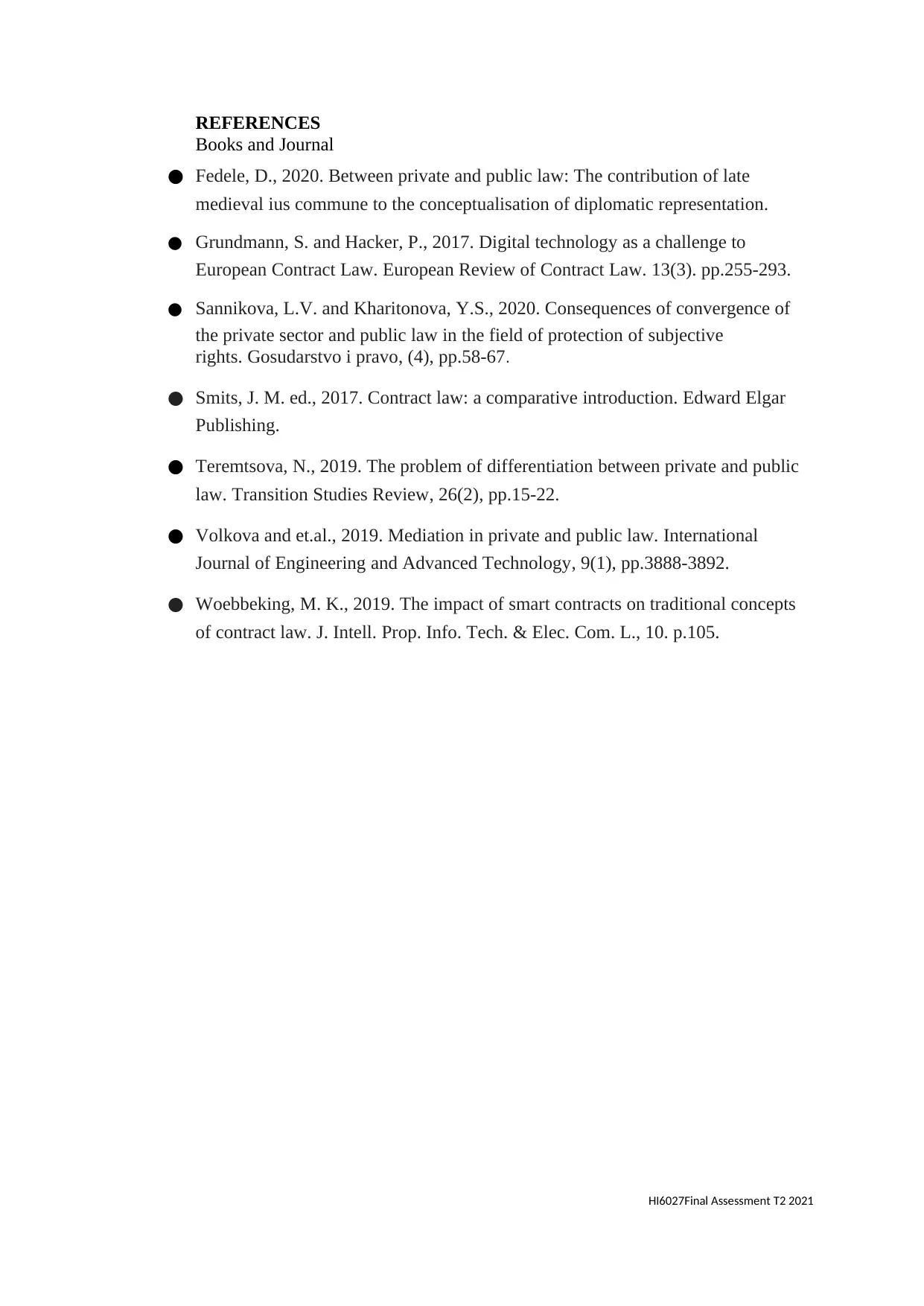
REFERENCES
Books and Journal
● Fedele, D., 2020. Between private and public law: The contribution of late
medieval ius commune to the conceptualisation of diplomatic representation.
● Grundmann, S. and Hacker, P., 2017. Digital technology as a challenge to
European Contract Law. European Review of Contract Law. 13(3). pp.255-293.
● Sannikova, L.V. and Kharitonova, Y.S., 2020. Consequences of convergence of
the private sector and public law in the field of protection of subjective
rights. Gosudarstvo i pravo, (4), pp.58-67.
● Smits, J. M. ed., 2017. Contract law: a comparative introduction. Edward Elgar
Publishing.
● Teremtsova, N., 2019. The problem of differentiation between private and public
law. Transition Studies Review, 26(2), pp.15-22.
● Volkova and et.al., 2019. Mediation in private and public law. International
Journal of Engineering and Advanced Technology, 9(1), pp.3888-3892.
● Woebbeking, M. K., 2019. The impact of smart contracts on traditional concepts
of contract law. J. Intell. Prop. Info. Tech. & Elec. Com. L., 10. p.105.
HI6027Final Assessment T2 2021
Books and Journal
● Fedele, D., 2020. Between private and public law: The contribution of late
medieval ius commune to the conceptualisation of diplomatic representation.
● Grundmann, S. and Hacker, P., 2017. Digital technology as a challenge to
European Contract Law. European Review of Contract Law. 13(3). pp.255-293.
● Sannikova, L.V. and Kharitonova, Y.S., 2020. Consequences of convergence of
the private sector and public law in the field of protection of subjective
rights. Gosudarstvo i pravo, (4), pp.58-67.
● Smits, J. M. ed., 2017. Contract law: a comparative introduction. Edward Elgar
Publishing.
● Teremtsova, N., 2019. The problem of differentiation between private and public
law. Transition Studies Review, 26(2), pp.15-22.
● Volkova and et.al., 2019. Mediation in private and public law. International
Journal of Engineering and Advanced Technology, 9(1), pp.3888-3892.
● Woebbeking, M. K., 2019. The impact of smart contracts on traditional concepts
of contract law. J. Intell. Prop. Info. Tech. & Elec. Com. L., 10. p.105.
HI6027Final Assessment T2 2021
1 out of 7
Related Documents
Your All-in-One AI-Powered Toolkit for Academic Success.
+13062052269
info@desklib.com
Available 24*7 on WhatsApp / Email
![[object Object]](/_next/static/media/star-bottom.7253800d.svg)
Unlock your academic potential
Copyright © 2020–2025 A2Z Services. All Rights Reserved. Developed and managed by ZUCOL.




